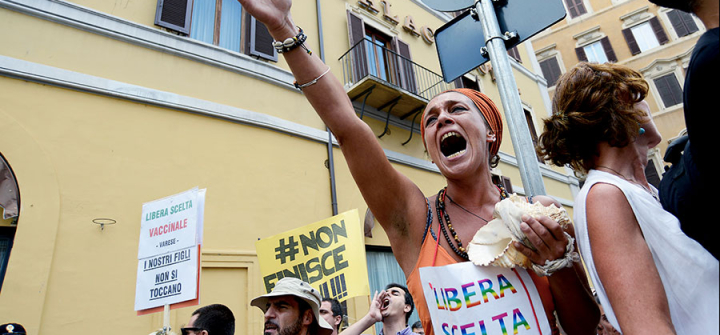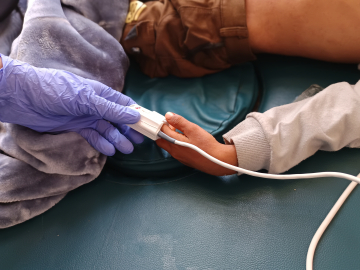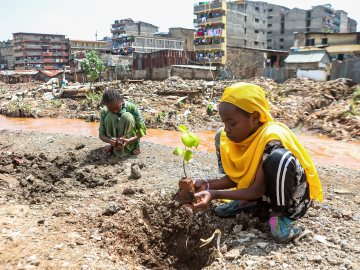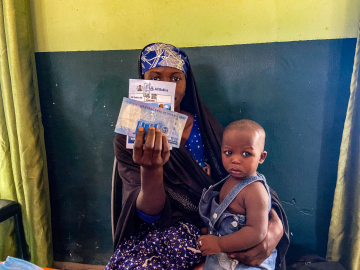Booster Shot for Vaccines
It wasn’t so much the message as the messenger.
“Vaccines are some of the most thoroughly tested medical products we have. Vaccines are safe, effective, and lifesaving.”
No one in Salle XXIII at the World Health Assembly on Tuesday afternoon was expecting anything different, nor would they doubt the statement’s veracity, but relief permeated the room as Alex Azar, US Secretary of Health and Human Services, delivered the full-throated endorsement of vaccines.
The US, under President Trump, unequivocally was backing vaccines on the world stage.
As recent measles outbreaks popped up across the US in recent months, there was “radio silence” from the White House, noted an April 23rd STAT article. During the 2016 campaign, Trump met with anti-vaccine leaders and prominent vaccine skeptics. And a 2014 Trump tweet infamously cited the refuted vaccine-autism myth. While administration officials like CDC director Robert Redfield have publicly backed vaccines, Trump didn’t encourage vaccination until late last month.
The US has recorded more than 700 cases of measles—the most since it was declared eliminated in 2000.
After noting that the WHO has documented more than 112,000 confirmed measles cases worldwide, Azar doubled down on the US support for vaccines: “… you will find no government more committed than the United States to combating these challenges and strengthening immunization programs around the world.”
Azar was followed by the EU Health and Food Safety Commissioner Vytenis Andriukaitis, as well as health ministers from Brazil, Ukraine and Romania, who shared their countries challenges with vaccine skepticism and measles. They cited the more than 16,000 measles cases and 60 deaths since 2016 in Romania, and the 100,000 cases since 2017 in Ukraine, which was the “result of years of misinformation by the previous administration.”
Peter Hotez, dean of the National School of Tropical Medicine at Baylor College of Medicine in Houston, described his own battles against misinformation on social media. The father of a daughter with autism, Hotez was moved to write a book titled Vaccines Did Not Cause Rachel's Autism—“which as you can imagine has put me into the witness protection program,” he said.
Hotez urged the global public health community to ceaselessly fight for vaccines, noting that there are “at least 480 misinformation websites all amplified on social media and dozens of fake books.”
Theresa Tam, Canada’s chief public health officer, said she had reached out to Twitter, Facebook and Google officials. She found a very small number of people (and bots) spread massive amounts of misinformation.
Her team is working with Twitter on an initiative to have users presented with accurate information when users search on antivaccine topics. With WHO, she also is working with Facebook on how to collaborate on removing information that has been scientifically disproven.
She proposed a coalition of public health partners that can retweet and forward accurate information in the same way antivaccine groups do.
“We are all trying to figure out what more we can do together,” Tam said.
Gavi CEO Seth Berkley said the public health community has to appreciate the danger—and speed—that misinformation presents. “Vaccine hesitancy, this is a disease that spreads at the speed of light,” Berkley said. “Just as there are no barriers to infective agents, there are no barriers to misinformation.”
In his own discussions with social medial leaders, he emphasizes the high-stakes risks that come with distributing antivaccine messages on their platforms. “I remind them this kills people,” he said. “This is not freedom of speech. This is wrong information that is killing people.”
Ed. Note: Check out the latest news from #WHA72 here.
Join the tens of thousands of subscribers who rely on Global Health NOW summaries and exclusive articles for the latest public health news. Sign up for our free weekday enewsletter, and please share the link with friends and colleagues: http://www.globalhealthnow.org/subscribe.html
Protesters demonstrating in Rome, Italy on July 28, 2017 as Italy’s lawmakers voted to make vaccinations mandatory for children at school registration. Image: Simona Granati/Corbis/Corbis via Getty





